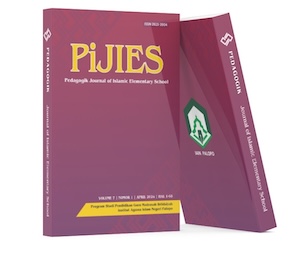Development of Edugames on Pancasila Material to Improve Learning Outcomes of Grade IV Students in Elementary Schools
DOI:
https://doi.org/10.24256/pijies.v7i2.5947Abstract
This research and development project utilizes the 4-D model, comprising four stages: definition, design, development, and dissemination. The research was conducted at MIN 6 Langkat from September to November during the 2024/2025 academic year. The participants included 20 fourth-grade students, 11 of whom were female and nine were male. The edugame focused on Pancasila material, which was the subject of this study. Data collection involved observation, interviews, questionnaires, and testing. The gathered data were analyzed using two methods: (1) an analysis of the edugame's feasibility and (2) an analysis of its effectiveness. The validation from language experts yielded a score of 88.65%, which falls under the feasible category. In comparison, material experts rated it at 90.10%, classifying it as very feasible, and media experts provided a score of 96.75%, marking it as very feasible. The students’ pretest average in the trial was 35.07%, and the post-test score increased to 64.93%. Based on the validation and trial results, it can be concluded that the edugame on Pancasila content for grade IV students at MIN 6 Langkat is both feasible and effective.
References
Chen, MB, Wang, SG, Chen, YN, Chen, XF, & Lin, YZ (2020). A preliminary study of the influence of game types on the learning interests of primary school students in digital games.Education Sciences,10(4), 96.
Cheung, S.Y., & Ng, KY (2021, March). Application of the educational game to enhance student learning. InFrontiers in Education(Vol. 6, p. 623793). Frontiers Media SA.
Hardian, R. (2019). Development of mobile mathematics edugames to improve basic arithmetic skills of elementary school students in grades 4 and 5.Visual Language Journal,2(2), 98-108.
Landrum, T. J., & McDuffie, K. A. (2010). Learning styles in the age of differentiated instruction.Exceptionalism,18(1), 6-17.
Lubis, RR, Dwiningrum, SIA, & Zubaidah, E. (2023). Development Powtoon Animation Video in Indonesian Language Learning to Improve Student Learning Outcomes Elementary Schools.Journal of Computer Science, Information Technology and Telecommunication Engineering,4(2), 427-433.
Madina, S., Suparno, NO, Marni, A., & Aulia, GA (2024). IMPLEMENTATION OF PANCASILA EDUCATION TO REALIZE THE NATION'S IDEALS AND GOALS.Journal of Social Education and Humanities,3(4), 5160-5167.
Mukaromah, SA, Gusmawan, A., & Munandar, J. (2022). The Lunge of Global Ideologies: The Challenges of Pancasila Ideology Education in the Middle of Global Existence in the Era of Globalization.Panjar Journal: Community Service in the Field of Learning,4(1), 1-30.
Panjaitan, NAS, & Al Rasyid, H. (2023). Development of Arabic Comic Learning Media Based on Canva.Journal of Education Research,4(2), 484-495.
Parinduri, WM, Lubis, RR, Rambe, TR, & Rambe, N. (2022). Development of Flipbook Based Smart Card Learning Media in Science Learning to Improve Student Learning Motivation Class III Elementary School.School Education Journal PGSD FIP Unimed,12(3).
Pramita, C., & Putri, TR (2023). The Effect of Learning Interest on Students' Concept Understanding Ability Against Subject Pressure.International Journal of Education and Teaching Zone,2(2), 243-253.
Rahayu, Y., Ahmad, HA, & Alamsyah, IM (2021). The implementation of tpack framework in mathematics mobile edugame design: Basic multiplication and division concept. Journal of Physics: Conference Series, 1722(1).https://doi.org/10.1088/1742-6596/1722/1/012029
Rahayu, WI, Leksono, SM, & Nulhakim, L. (2024). Mobile Learning Based Learning Using Etno Edu Games to Improve Students' Critical Thinking and Cognitive Abilities on IPAS Subjects in Grade IV Elementary School.Journal of Science Education Research,10(9), 6504-6515.
Rambe, N., Parinduri, WM, & Lubis, RR (2023). Character Education-Based Modules in Indonesian Language Learning to Improve Student Learning Outcomes in Elementary Schools.Pedagogical Journal of Islamic Elementary School,6(2), 135-146.
Ryan, R. M., & Deci, E. L. (2000). Intrinsic and extrinsic motivations: Classic definitions and new directions.Contemporary educational psychology,25(1), 54-67.
Suryanto, H., Ghofur, A., & Zaman, AQ (2024). The Effect of the Teams Games Tournament (TGT) Model and Motivation on Understanding Pancasila Philosophy.Edunesia: Scientific Journal of Education,5(1), 402-423.
Taşçı, B.G. (2016). Theoretical framework for using digital games in architecture education.Architecture Research,6(3), 51-56.
Umisara, E., Mutaqin, A., & Hidayah, SUN (2023). Development of Educational Augmented Reality Game as English Language Learning Media with Character Education Values.Vehicle,75(2), 73-86.
Weymouth, J., & Atuah, R. (2022, December). Review of Video Games & Simulation in Computer Science Education. In2022 International Conference on Computational Science and Computational Intelligence (CSCI)(pp. 2091-2096). IEEE.
Zakiya, A., & Santoso, G. (2024). Habituation of the Mutual Cooperation Character in Pancasila Education in Elementary Schools.IJEBD (International Journal of Entrepreneurship and Business Development),7(4), 785-793.
Downloads
Published
How to Cite
Issue
Section
Citation Check
License
Copyright (c) 2025 Irfan Dahnial

This work is licensed under a Creative Commons Attribution-ShareAlike 4.0 International License.
Copyright notice:
Authors retain copyright and grant the journal right of first publication with the work simultaneously licensed under an Attribution-ShareAlike 4.0 International (CC BY-SA 4.0) (https://creativecommons.org/licenses/by-sa/4.0/) that allows others to share the work with an acknowledgement of the work's authorship and initial publication in this journal.
Authors are able to enter into separate, additional contractual arrangements for the non-exclusive distribution of the journal's published version of the work (e.g., post it to an institutional repository or publish it in a book), with an acknowledgement of its initial publication in this journal.
Authors are permitted and encouraged to post their work online (e.g., in institutional repositories or on their website) prior to and during the submission process, as it can lead to productive exchanges, as well as earlier and greater citation of published work (See the Effect of Open Access)







 This is an open access article under the
This is an open access article under the 